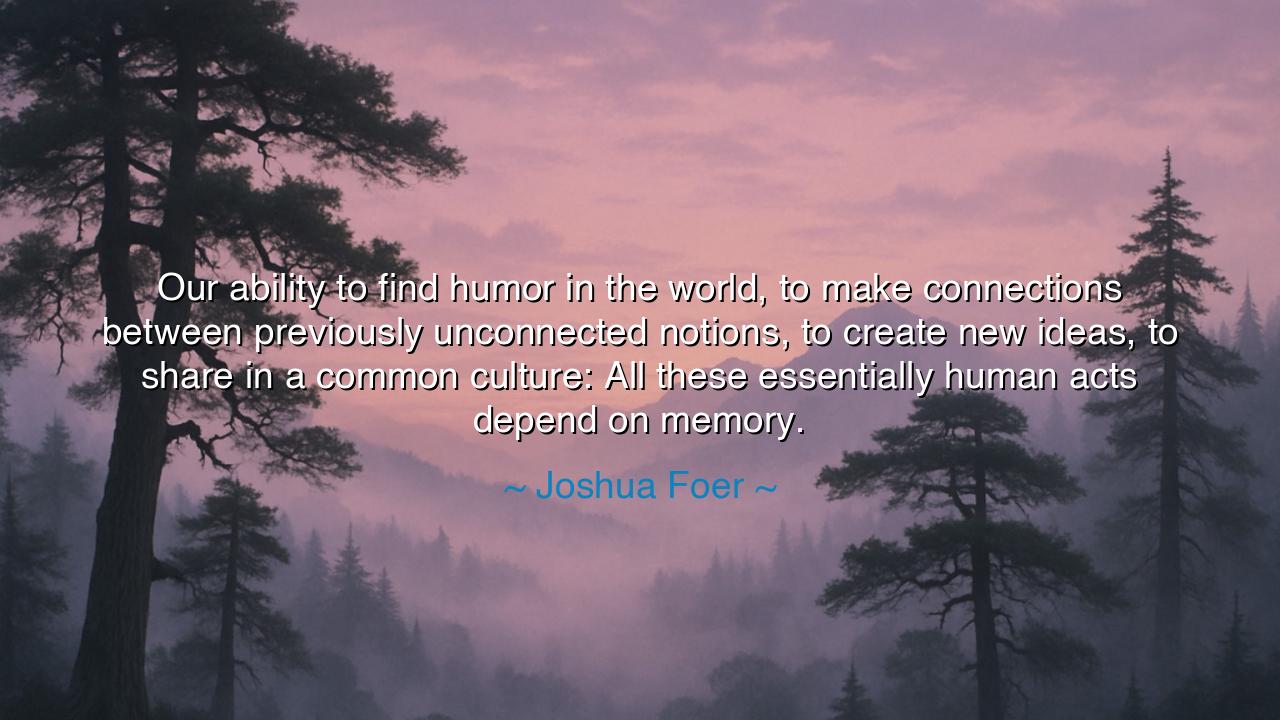
Our ability to find humor in the world, to make connections
Our ability to find humor in the world, to make connections between previously unconnected notions, to create new ideas, to share in a common culture: All these essentially human acts depend on memory.






The words of Joshua Foer, “Our ability to find humor in the world, to make connections between previously unconnected notions, to create new ideas, to share in a common culture: All these essentially human acts depend on memory,” are not simply an observation of the mind — they are a hymn to the soul of humanity, to that sacred fire within us called memory. In these words lies a profound revelation: that memory is not merely a storage of facts, but the foundation of consciousness itself, the bridge between past and present, between self and world. Without memory, there can be no laughter, no creativity, no culture — only the endless moment of forgetfulness, where wisdom cannot take root and the spirit cannot grow.
From the dawn of civilization, the ancients revered memory as a divine force. The Greeks called her Mnemosyne, mother of the Muses, for they knew that all art, all poetry, all invention spring from remembrance. To recall is to connect — to draw lines between what was and what is, to find patterns where chaos once reigned. Foer’s words remind us that it is this act of connection that gives birth to both humor and genius. When we laugh, it is because we recognize something familiar twisted into new form; when we create, it is because our memory reshapes the fragments of experience into something yet unseen. Thus, memory is not passive, but living — a fertile soil from which the human imagination blossoms.
Consider the story of Simonides of Ceos, the ancient poet who first discovered the art of memory. When a banquet hall collapsed, crushing those within, it was Simonides who could name each of the dead — not by their faces, but by the places where they had sat. From this, he learned that memory lives through association, through the linking of one image to another. And this lesson still echoes in Foer’s words: to remember is to connect, and through connection we find meaning. Without memory, the world is a shattered banquet, all faces forgotten, all places lost.
It is through memory that we share a common culture, that invisible tapestry of stories and symbols that binds strangers into a people. A song remembered, a proverb spoken, a gesture repeated through generations — these are not mere customs, but vessels of continuity. When a culture forgets, it dies, just as a person without memory loses their sense of self. Thus, Foer’s reflection is not only intellectual but moral: to preserve memory — personal or collective — is to preserve our humanity. The humor we share, the ideas we form, the dreams we pass on — all are threads woven from remembrance.
In our modern age, we have grown careless with this sacred power. We rely on devices to remember for us, trading the discipline of recollection for the convenience of storage. Yet in doing so, we risk dulling the mind’s ability to see patterns, to make the leaps that give birth to laughter, art, and insight. The ancients trained their memories like warriors trained their bodies; they understood that a well-kept memory is not a burden, but a source of freedom. The philosopher Cicero called memory “the treasury and guardian of all things,” for it allows us to carry the wisdom of a thousand lives within the space of one.
But memory is not only the keeper of knowledge — it is also the healer of the heart. Through it, we find humor in sorrow, beauty in loss, and continuity in change. To remember is to make peace with the passage of time. The one who laughs at life remembers that others have struggled and survived; the one who creates new ideas remembers the fragments of older ones; the one who loves remembers the moments that shaped their soul. Memory, then, is both teacher and companion, guiding us gently through the ever-changing landscape of existence.
Let this then be the teaching: tend to your memory as you would to a sacred flame. Feed it with knowledge, with stories, with reflection. Do not abandon it to the machines of the age, but exercise it — recall, connect, and create. Keep alive the memory of where you have come from, for only then will you know where you are going. Cherish the laughter that springs from shared remembrance, and honor the culture that memory sustains. For without it, we are but shadows moving through the dark, forgetful of who we were, unable to become who we might be.
And as Joshua Foer reminds us, all that makes us human — our humor, our art, our imagination, our capacity to love and to understand — rests upon this fragile yet enduring gift. To remember is to live twice: once in experience, and once in wisdom. Guard that power well, for it is the root of every connection, the mother of every idea, and the quiet pulse of all that is human.






AAdministratorAdministrator
Welcome, honored guests. Please leave a comment, we will respond soon